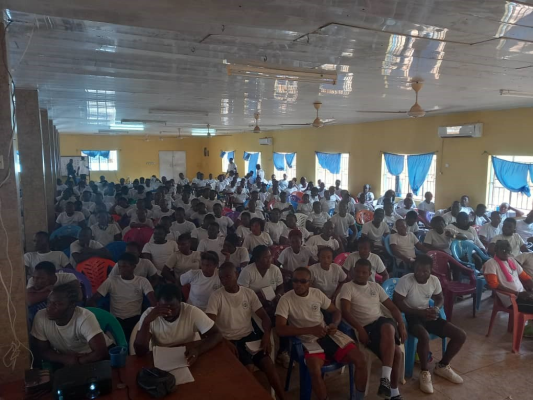HRCSL NEWS AND EVENTS

Posted By: John Peter Fuller ⇒ Posted Date: 2/16/2024
The Chairperson of the Human Rights Commission of Sierra Leone (HRCSL), Mrs. Patricia Narsu Ndanema on Monday 12th February delivered a public lecture on fundamental human rights to approximately 500 National Youth Service Corps at the Peace Mission Training Center at Hastings in Freetown. She expressed gratitude to the management of NYSC for inviting her to serve as a guest lecturer for the fourth time, describing it as one that will help to build the culture of human rights in tomorrow’s leaders. Delivering her lecture on the theme “Fundamental Human Rights”, Mrs. Ndanema spoke about the three generations of human rights, highlighting the rights to life, to vote and to be voted for, freedom of assembly and association, freedom of movement and freedom of speech as examples of the first generation of rights (Civil and Political Rights). “The CPR rights are justiciable rights, meaning a citizen can access the courts if denied the enjoyment of these rights,” she said. She mentioned the rights to work, social security, education, health, family and divorce as examples of Economic Social and Cultural Rights (ESCR), as well as the third generation of rights which include the rights to peace, clean and healthy environment.
The Chairperson touched on some of the local, regional and international human rights instruments and informed the students about the importance of knowing human rights laws as they claim their rights within the confines of the law. She encouraged particularly the female students to be familiar with laws and policies protecting their rights, and highlighted some provisions in the Gender Equality and Women’s Empowerment (GEWE) Act 2022 and the benefits therein, as well as other laws related to the promotion of Women’s Rights. The thrilled audience was further informed that even though they have their rights, it cannot be fully enjoyed as there are situations where the enjoyment of rights can be suspended, limited or restricted within the confines of the law, citing state of emergency and as an example where citizens’ rights to freedom of movement can be limited and during the outbreak of contagious diseases. Mrs. Ndanema drew the attention of the students to Article 4 of the International Covenant on Civil and Political Rights (CPR) which gives states the responsibility to protect its citizens when the life of the state is threatened, citing the steps taken by government during the Corona pandemic as an example. Students were further informed that before such measures are taken by the state, principles not limited to those mentioned must be taken into consideration, citing necessity, legality, reasonability and justifiability. The HRCSL Chairperson also informed students about the basic characteristics of human rights, noting that human rights are universal, inalienable, interdependent, indivisible etc. “The enjoyment of one right can lead to the enjoyment of several other rights,” Mrs. Ndanema noted and highlighted the right to be voted for as an example of a right that accompanies several other rights such as the rights to freedom of movement, assembly and association and speech. She encouraged students to be good citizens and not take the law into their hands and spoke about the ills of violence in the country that had led to the loss of lives and properties and subsequently the non-enjoyment of human rights. She strongly stated that a good citizen must abide by the laws of the country and strongly condemned all acts of protests against the provisions highlighted in Section 17 (1) of the Public Order Act, 1965. She concluded by informing the students that the enjoyment of human rights goes with responsibilities and as good citizen, their attitudes should be reflective of the provisions stipulated in Section 13 A-J of the Constitution of Sierra Leone 1991 which talks about responsibilities of citizens and Article 27 to 29 of the African Charter on Human and Peoples Rights which also defines our responsibilities as good citizens. She emphasized that the youth are the future leaders and should therefore be mindful of the provisions stipulated in Section 13 (c) of the 1991 Constitution which encourages all to desist from misappropriation of government funds which are meant for developmental programmes and subsequently the enjoyment of human rights. She added that making human rights real is the collective responsibility of all. The topics discussed during the presentation engendered a lot of discussions amongst the students thus giving them the opportunity to ask questions and make contributions during the sessions. The Director of Education, Communication and Training, Richard Tamba M’Bayo informed the meeting about the creation of the Commission and its functions, and encouraged all to access the services of the Commission. The Corps expressed appreciation to the Human Rights Commission of Sierra Leone and noted that the knowledge gained during the session will go a long way in helping them live a life worthy of human rights standards.